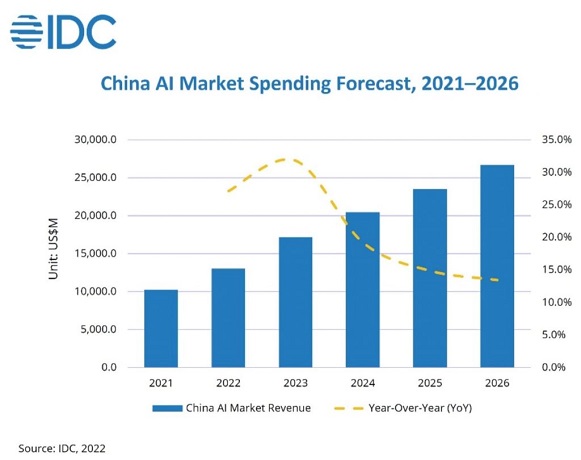Crayfish writes ...
In this article we try to provide an overview of China's AI policy initiatives, summarise China’s AI development and the challenges it faces, explore the investment trends, and provide valuable insights into the country's AI market and the opportunities for collaboration between China and UK AI business.
Artificial Intelligence (AI) has emerged as a transformative technology that carries vast implications for various sectors of society. China, with its ambitious national strategy, has rapidly become a frontrunner in the global AI race. This article gives an overview of China’s AI policy initiatives, summarises China’s AI development and the challenges it faces, explores the investment trends, and provides valuable insights into the country’s AI market and the opportunities for collaboration between China and UK AI business.
Government Support and Policies
China’s artificial intelligence (AI) industry has received significant support from the government to make it an integral part of national strategy and a key focus of international competition. The government has implemented policies such as the “Next Generation Artificial Intelligence Development Plan” and other industrial policies to support the long-term development of the AI industry. Financial resources, including the National AI Development Fund, have been allocated to invest in AI research, development, and commercialisation.
To create a conducive environment for AI development, the Chinese government has promoted data sharing, encouraged collaboration between academia and industry, and attracted foreign talent and investment. The government has encouraged the integration of AI technologies in a number of sectors such as healthcare, transportation, and finance.
China’s abundance of data has played a crucial role in AI development. The government has invested in digital infrastructure and data centres to support data collection, storage, and processing. Initiatives like the China National Engineering Laboratory of Big Data Analysis and Applications have facilitated the utilisation of big data for AI research.
China’s commitment to national policies, financial resources, data infrastructure, and supportive initiatives has propelled the growth and competitiveness of its AI industry.
China’s AI Development
China’s AI technology industry is driven by the desire for deep technological innovation and a demand for application. The focus is on building globally competitive AI industry clusters and establishing an independent and controllable technology system. The clusters are primarily located in key cities such as Beijing-Tianjin-Hebei, Yangtze River Delta, Pearl River Delta, and Sichuan-Chongqing, but other cities are also showing signs of developing AI clusters. Major players in China’s AI industry include tech giants Baidu, Alibaba, Tencent, Huawei, and iFlytek, as well as research institutes and universities.
AI technologies in China are being deployed across various sectors, including healthcare, transportation, finance, and retail. The use of robots in assembly production lines and self-driving vehicles on urban roads demonstrates the broadening application capabilities of AI. The government sector, including public security, traffic police, and transportation management, is a major customer in China’s AI market, particularly for urban governance and operations.
The capital in China’s AI industry is mainly focused on early-stage investments in AI companies. According to a report in the Forward- Economist, from 2014 to 2018, both the number and scale of financing events for AI development showed continuous growth. In 2018, the financing amount reached 136.6 billion yuan after 1049 financing events. Although financing events decreased from 2019 to 2020, the financing scale increased. However, in 2021, the AI capital market experienced another wave of growth with an increase in the number and scale of investment and financing events. By October 2022, there were 532 investment and financing events in the AI industry, amounting to 100.8 billion yuan.
Based on the reports of ASKCI and Insight & Info, China’s core artificial intelligence industry reached 508 billion yuan in 2022, with nearly 4,000 enterprises. It has become a new growth engine and forms a complete industrial system. The artificial intelligence market continues to attract investment, although capital tends to be more rational. The number of AI investment and financing events in China has been increasing overall, with a peak in 2020 at 1,773 events. While the financing amount declined in 2021-2022, it still remained at a high level.
IDC’s report, the Worldwide Artificial Intelligence Spending Guide, describes that China’s AI industry is expected to reach $14.75 billion in spending by the end of 2023, accounting for about 10% of the global total. The market is expected to have a compound annual growth rate of over 20% between 2021 and 2026, reaching a value of $26.44 billion by 2026. The report emphasises the importance of innovation and technological advancements in AI and highlights the enthusiastic demand for digital transformation in China’s AI industry.

Challenges to China’s AI Development
China’s AI development heavily relies on the collection and usage of vast amounts of data. However, ensuring the quality, accuracy, and reliability of the data is a challenge. Data privacy concerns have also arisen, as the use of personal data for AI applications raises questions about consent, security, and the protection of individuals’ privacy rights.
Despite China’s efforts to cultivate AI talent, there is still a shortage of skilled professionals in certain specialised areas. The demand for AI experts exceeds the current supply, leading to intense competition for talent. Retaining top talent and bridging the skill gap remain significant challenges.
As AI technologies advance, ethical considerations become increasingly more important. China faces challenges in addressing issues such as algorithmic transparency, fairness, and bias. Ensuring the responsible and ethical deployment of AI systems is crucial to maintaining public trust and mitigating potential negative impact.
While China has made remarkable progress in AI development domestically, greater international collaboration and standardisation efforts are essential to addressing the global challenges and ensuring interoperability. Harmonising AI standards and frameworks across different countries would facilitate cooperation and break down potential barriers.
While China has made significant strides in AI research and development, the maturity and deployment of AI technologies in certain industries is still evolving. Practical implementation and scalability of AI solutions across sectors requires continued refinement and validation.
Strengthening intellectual property protection is another challenge for China’s AI development. To foster innovation and attract foreign investment, it is crucial to establish robust legal frameworks and mechanisms to protect intellectual property rights effectively. As AI technologies become increasingly pervasive, ensuring transparency and accountability in their decision-making process is vital. Addressing concerns about explainability, accountability, and potential biases in AI systems is essential to building trust and ensure the ethical use of AI.
UK AI Development and Advantages
The UK has positioned itself as a global leader in AI development, with a thriving ecosystem supported by research institutions, startups, and government initiatives. The AI Sector Deal launched by the UK government aims to promote AI innovation through investment, research funding, skills development, and regulatory support.
The recently concluded 2023 London Tech Week highlighted discussions on AI development and innovation, emphasised the importance of safety research, international cooperation, and collaboration with academia and AI companies, and hosted thought-provoking conversations around AI development and innovation. The UK Prime Minister, Rishi Sunak, emphasised the importance of safety research in the UK’s AI policy and of partnering with academia and AI companies to ensure the safe development, deployment, and use of AI technology across the economy. Sunak also announced the £100 million foundation AI taskforce that would provide funding for AI safety and stressed the need for international cooperation in establishing standards and regulations for governing AI, stating that AI transcends borders. An upcoming international AI summit was announced that aims to foster international collaboration on AI.
Conversations between Sunak and Demis Hassabis, the co-founder of Google DeepMind, during London Tech Week, further stressed collaboration, responsible regulation, and ethical considerations in harnessing the potential of AI. Microsoft UK’s CEO introduced the concept of “AI CoPilots” and emphasised the importance of an ethical framework to guide AI adoption and collaboration in the tech industry.
The UK prioritises ethical and responsible AI development, thus ensuring transparency, fairness, and accountability. The country has applied AI technologies to various sectors, including healthcare, finance, robotics, and automation, and has improved the efficiency and decision-making in them all. It attracts international talent to benefit from a diverse pool of experts and fosters knowledge exchange. The UK has a robust legal and regulatory framework that promotes innovation while upholding ethical standards. The startup ecosystems in cities like London and Cambridge are vibrant, and both are drivers of innovation and economic growth. Collaboration between academia, industry, and government strengthens the UK’s AI industry, facilitates partnerships and accelerates the adoption of AI technologies.
Insights on China-UK Collaboration in the AI industry
The UK and China both address the importance of AI in national development and have the potential for successful collaboration in the AI industry, which would lead to mutual benefits such as technological advancements, economic growth, and talent development. The collaboration could take place in many areas and forms. Joint research projects and knowledge exchange could accelerate advancements in AI technologies. Talent exchange programs could facilitate the transfer of expertise and contribute to the growth of AI talent pools. Partnerships between Chinese and UK AI companies could lead to the joint development of AI solutions and products. Collaborating on international standards and regulations could ensure ethical AI development. Investment and funding collaborations could support AI startups and initiatives. Collaboration in cross-border AI applications like smart cities, healthcare, transportation, and finance could result in shared experiences and beneficial solutions for both countries.



